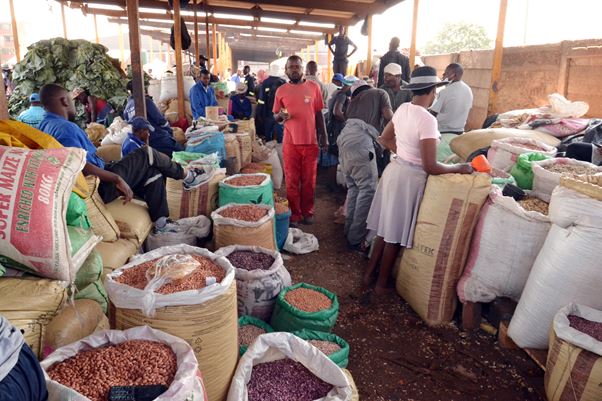The value of connecting seed fairs, community seed banks and mass markets
African mass food markets are more famous for providing food to diverse classes of consumers and income to a wide range of farmers. However, what remains under appreciated is the role of these markets in promoting indigenous seed systems on which the majority of smallholder farmers depend. A very important undocumented practice is how mass food markets represent the commercial side of sustaining indigenous food systems because that is where demand for indigenous seed is greater. Mass markets show farmers and farming communities the need for dedicating more land to indigenous seed production.

Connecting seed fairs and seed banks with mass markets
Connecting community seed banks, seed fairs and mass food markets can go a long way in advancing food sovereignty. That is also how Community-Based Organizations can be champions of facilitating key stakeholder dialogues for recognition of indigenous food, tracking indigenous food as well as building indigenous food systems investment packages and commercial models. Instead of being once-off events, seed fairs that are also linked to community seed banks should be extended beyond local communities where knowledge about these seeds already exists and almost everyone has the same seed varieties.
The fact that mass markets have convening power to mobilize commodities from diverse parts of a country means more traction and impact will be gained if community seed banks and seed fairs are moved to mass markets which are the demand side. The way some food commodities are demanded is the mass market is the same way some seed varieties are asked for in the market as farmers look for seed and other inputs. Weekly seed fairs at the market can demonstrate the relationship between mass markets, seed fairs and community seed banks. Such a weekly seed fair can be done towards the planting season so that traders and new farmers also acquire knowledge on why they need to promote indigenous food.
Giving indigenous seed a commercial face
If commercial farms can be set aside for growing hybrid seeds through contracts, why can the same not be done for indigenous seed? Different varieties of sorghum, yellow maize, indigenous rice, tubers and indigenous chicken breeds should be mapped to identify communities or regions where they do best. Such areas can become major hubs for research and production of seed in ways that simplify tracking and patenting all the way to seed markets.
Where do farmers get uncontaminated seed? Such questions can only be answered satisfactorily if a whole supply chain of indigenous seed is developed. At times it is not about certification of seed but certifying the market. Certification should also be guided by indigenous knowledge and elders whose input is key embedding indigenous knowledge into seed. The same process can be used to identify wild fruit trees and wild insects. Clear mapping will capacitate communities to lead in producing indigenous food based on seed whose knowledge they hold. When seed markets are established alongside mass food markets, demand and distribution of indigenous seed and food becomes easy to track and monitor. That is also how community seed banks can develop commercial and sustainability models as many critical market actors like traders participate in seed fairs.
While industrial seed companies have agents who aggressively promote their seed and related inputs like fertilizers in supermarkets and wholesale merchants, efforts to build indigenous seed the way industrial seed companies promote their seed and related inputs is missing in indigenous food systems. Indigenous seed has its own supply and distribution systems from farmers to mass markets and then to consumers but such pathways lack recognition and support. On the other hand, with support from policies, industrial seed systems have invested in protecting the benefits of their seeds through contracts and supply chains. The same is not happening to indigenous food systems.
Importance of structured dialogue through food festivals
Over the past few years seed fairs and food festivals have become powerful dialogues and knowledge cafes as advocacy pathways for protecting and recognizing indigenous seed, the environment, food systems and ecosystems. Behind such efforts should be a system of generating evidence not just projects. It is unfortunate that siloed initiatives and approaches have resulted in funders dictating their own objectives in community seed banks. For instance, to what extent are USAID objectives linked to the objectives, values and principles of local Community-Based Organizations (CBOs) that may be receiving funding from USAID? How loud is agroecology in activities by development organizations in communities? To what extent are CBOs influencing land use management in a competitive environment where government and the private sector are aggressively promoting hybrids and industrial agriculture?
Food festivals can lead to restorative pathways for promoting indigenous seed systems through:
- Mapping areas that produce diverse seed varieties, sweet potatoes, indigenous fruits and edible insects.
- Based on the mapping, field visits can be conducted to assess volumes, profile potential supply corridors, diverse seed varieties and seasonal commodities.
- Building seed preservation business models based on mapping.
While commercialization should be pursued with caution, it can be the best way of incentivizing farmers and communities to produce and preserve a lot of indigenous seed that would otherwise become extinct. It is not enough for farmers to bring their seed for exhibition and go back home with their seed when they need income to sustain themselves. In the absence of viable business models around indigenous seed, farmers and communities will not be able to attach meaningful value to their seed and end up succumbing to imposition of hybrid seed on their food systems.
charles@knowledgetransafrica.com / charles@emkambo.co.zw /info@knowledgetransafrica.com
Website: www.emkambo.co.zw / www.knowledgetransafrica.com
Mobile: 0772 137 717/ 0774 430 309/ 0712 737 430
